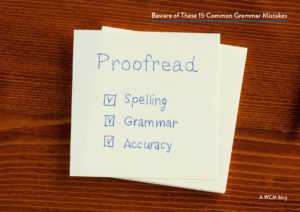
We’ve all been there, looking at an email or a blog to see one glaring error, whether it was a typo or elementary-level grammar mistake. While they’re honest, common mistakes, they’re still seen as unprofessional and can make the difference between a potential and a lost client. Here are 15 common errors to keep on your radar.
There/Their/They’re
- There (location) it is!
- They’re (they are) late.
- It is their (ownership) party.
Your/You’re
- Is this your (ownership) hat?
- You’re (you are) going to buy that hat?
Its/It’s
- It’s (it is) about time.
- Its (ownership) engine has stopped working.
Affect/Effect
- The effect (noun) was profound.
- The movie affected (verb) me.
Tip: If you can put “the” in front of it, it’s Effect
Me/I
Tip: Take out “Steve and” to see if it makes sense
- Will you send the magazine to Steve and me?
- Will you send the magazine to Steve and me?
- Steve and I worked on the magazine.
- Steve and I worked on the magazine.
Less/Fewer
- He has fewer than 10 (countable number) meetings.
- He’d like to have less (unknown number) meetings.
Lose/Loose
- We’re going to lose (not win) the game.
- The jerseys are loose (ill-fitted).
Bear/Bare
- There is a bear (animal) chasing me.
- I’m going to bare (show/naked) my soul.
Weather/Whether
- What’s the weather (rain/sun/snow) tomorrow?
- I will go whether (regardless) it is snowing or not.
Farther/Further
- I can walk farther (measurable) than 10 miles
- The galaxy goes further (abstract distance) than imaginable
A lot/Alot/ Allot
- A lot (high number) of students are hoping for a snowday
- The students should allot (allow) time to get to school in the snow
- Alot is not a word.
Principal/Principle
- He won’t go on the trip on principle (moral or truth).
- The principal (Pal, as in a person) went on the trip.
Which/That
Tip: Scratch out the part with “, which” and see if it was necessary
- The ice-cream, which was vanilla with sprinkles, melted quickly
- The ice-cream, which was vanilla with sprinkles, (a nice, though unnecessary fact) melted quickly
- Ice-cream that melts quickly is bad.
- Ice-cream that melts quickly is bad (The “that melts quickly” is necessary to the sentence)
Lay/Lie/Laid/Lied
Tip: People lie, things lay
- Go lie (recline) on the bed.
- Past tense: He lay on the bed.
- Lay (place) the paper down next to the bed.
- Past tense: He laid (past tense of lay) the paper down next to the bed.
- Don’t lie (tell a false truth) to your mother.
Backward/Backwards
- The only way to go is backward, because backwards isn’t a word
